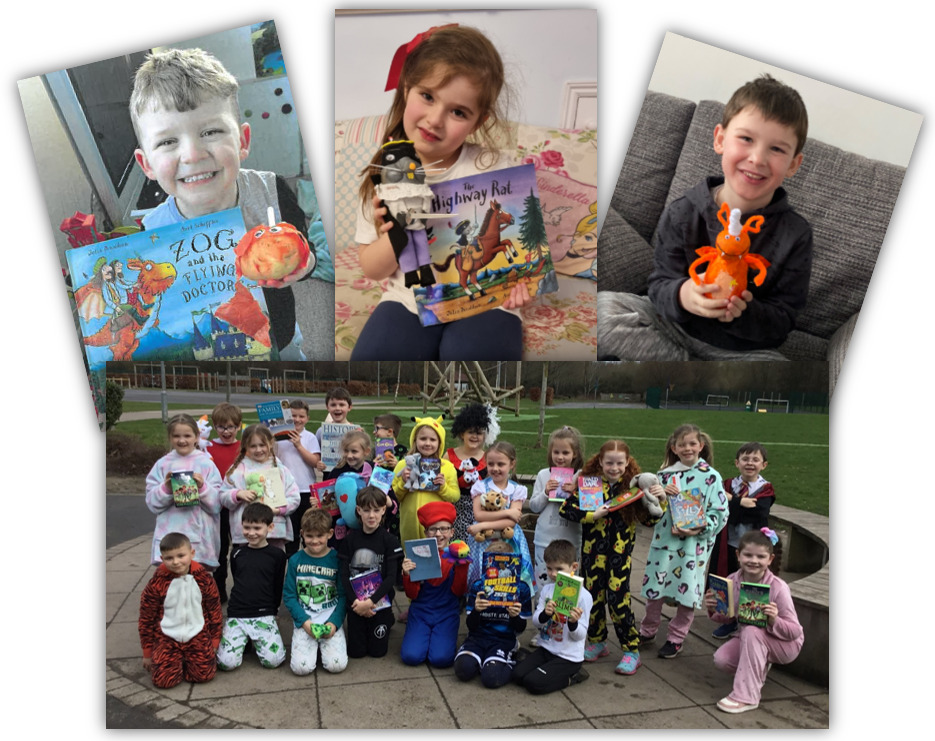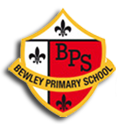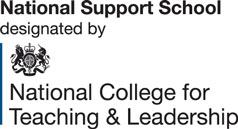Reading and Phonics
Intent
Reading is an integral part of everything we do at Bewley Primary. We believe that reading is key to academic success and we are dedicated to developing our children into lifelong readers.
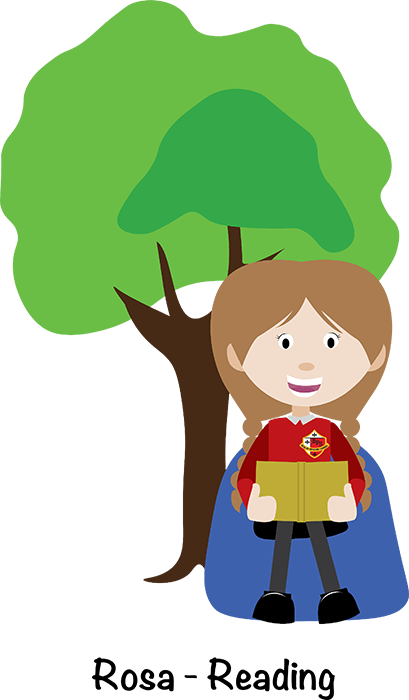
We aim to create Bright, Proud and Successful children by providing pupils with a literacy-rich environment, high quality texts and inspiring learning experiences and opportunities, which will help them to:
- gain a life-long enjoyment of reading and love of books.
- read accurately, fluently and with understanding;
- apply a knowledge of structured synthetic phonics in order to decode unfamiliar words with increasing accuracy and speed;
- be able to read with expression, clarity and confidence;
- develop a good linguistic knowledge of vocabulary and grammar;
- read and respond to a wide range of different types of texts;
- develop a deeper level of emotional intelligence and empathy;
- read fluently and with confidence.
Implementation
All children take part in daily, whole class reading related lessons that develop their decoding, blending, word recognition, fluency and comprehension skills. In addition to this, staff make use of opportunities across the curriculum to further improve and consolidate children’s reading skills.
EYFS & KS1 – Reading
Video – Introducing Read Write Inc

Our pupils learn to read effectively and quickly using the Read Write Inc. Phonics programme. Using a consistent assessment system, it allows us to group pupils homogeneously, according to their progress in reading. This ensures that well differentiated lessons are provided for all children and that any child at risk of falling behind, is identified quickly and necessary support is put in place. It also fosters rapid progress.
Starting in Nursery, our children are introduced to sounds through play when they are ready, before learning to decode letter-sound correspondences quickly and effortlessly. They rapidly learn sounds and the letter or groups of letters they need to represent them. Simple mnemonics help them to grasp this quickly. This is especially useful for pupils at risk of making slower progress. This learning is consolidated daily. Pupils have frequent practice in reading high frequency words with irregular spellings – common exception words.
We make sure that pupils read books that are closely matched to their increasing knowledge of phonics and the common exception words. This is so that, early on, they experience success and gain confidence in their own reading abilities. Re-reading and discussing these books with the teacher supports their increasingly fluency. Alongside this, the teachers read a wide range of stories, poetry and non-fiction to pupils which they are soon able to read for themselves.
The grid below shows the progression children make through the Read Write Inc. Phonics stages and the sounds learnt in each Set.

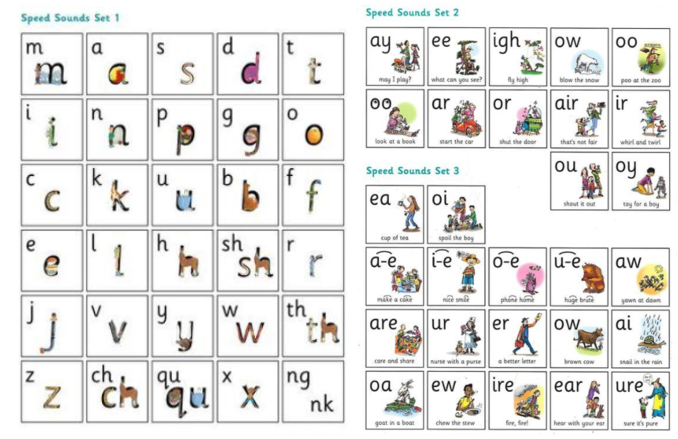
For children who require additional support, 1:1 phonics sessions are provided to support pupil progress which continue into lower Key Stage 2 as needed.
Most children complete the Read Write Inc. programme in the Autumn term of Year 2; however, those children who need further focus on decoding, blending and their fluency continue to have phonics teaching into KS2 to meet their needs.
Reading Comprehension
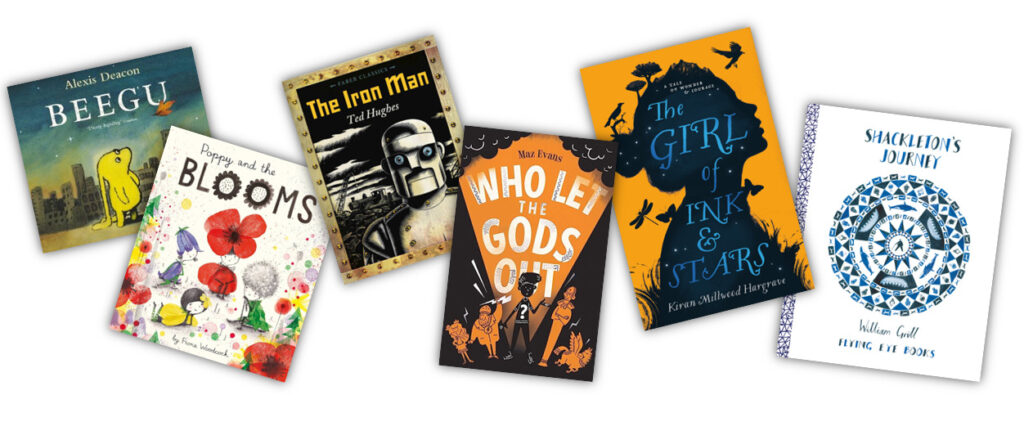
In EYFS, children begin to develop their comprehension skills in Read Write Inc. lessons and also more broadly during story time session.
In Key Stage 1 and 2, children build on their reading comprehension in daily, whole class VIPERS sessions. Teachers focus explicitly on teaching the skills of reading; vocabulary, infer, predict, explain, retrieve and sequence or summarise. These match to the content domains of the National Curriculum.
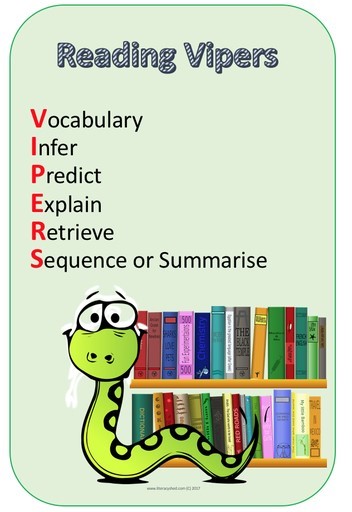
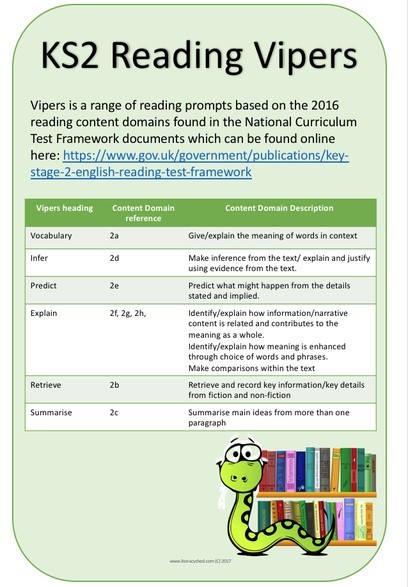
We use ‘Literacy Shed Plus’ which provides our teachers with a range of high quality texts, films and animations to enhance the teaching of reading.
Children access interesting and challenging texts that are read by adults who model expression, teach reading strategies and demonstrate how to form written answers. All of our class texts are interconnected with our termly topics, which allows children to make links and gain a deeper understanding of topic content.
Children who require additional support may work in a small group with a teacher or teaching assistant; however, they will still follow a VIPERS approach to reading and comprehension.
Additional Reading Opportunities:
Reading Plus
Reading Plus is an online programme which is used in KS2. It is effective in developing a child’s reading speed and fluency, and also checks they understand what they have read through the use of multiple-choice questions. This is used as a bridge from the fluency developed in the Read, Write Inc. phonics programme.
1:1 Reading
There are additional opportunities for children to read 1:1 and in small groups with trained adults each week. These sessions focus mainly on word reading and fluency; however, some general questioning does occur to support comprehension which is grounded in the VIPERS approach for consistency.
Independent Reading – ERIC Time (Everyone Reading in Class)
Every Friday afternoon during ERIC time, and also during other opportunities for independent reading throughout the week, children will choose their own books from class libraries to enjoy. This is an opportunity to read for pleasure rather than to practice their comprehension skills, as we recognise just how important it is to develop a love for reading.
Story Time
Most classes designate additional story time, usually at the end of the day, which focuses on reading for pleasure. An adult will read to the class with little to no questioning, other than to clarify what is happening.
Reading at Home
Every child, in every year group has access to stimulating, high-quality texts matched to their reading ability. Our main reading scheme, Oxford Reading Tree, is complemented with other book series to provide quality reading material covering fiction, non-fiction, poetry and reference books. We also offer a full online eBook library which ensures access to quality books too. These eBooks match the reading scheme in school that are colour banded according to their level of difficulty.
From Nursery through to Year 6, all children are provided with reading books to take home weekly. Initially, in EYFS, this may be a storybook to share with adults. As children progress and learn letter sounds and develop the ability to blend, then they are given books to take home that are matched to their phonic knowledge. Once they become confident, fluent readers then they are given books to further develop their understanding. All children are expected to read at least 3 times a week and reading progress is reviewed regularly.
Children should take their books home daily and we ask parents to make constructive comments on our electronic reading log. We recognise and value our shared role with parents in encouraging children in reading, not only in the strategies for learning to read but also to develop understanding, give opinions and extract information.
Book Bands
The table below shows the progression through the book band colours and also an approximate reading age.
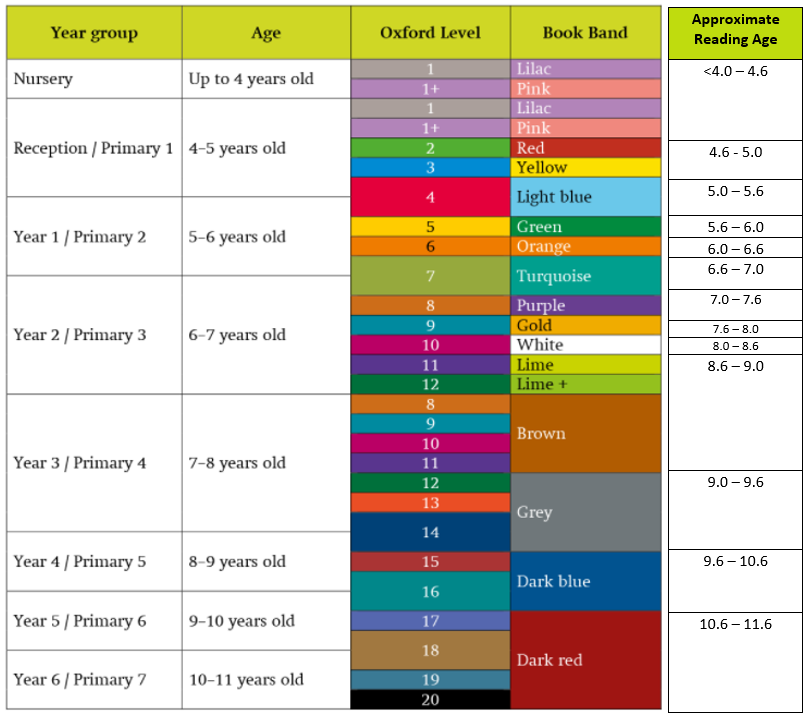
Children should be working within the colour bands for their year group unless there are other factors that have been identified by the class teacher.
As a rough guide, children in EYFS should aim to reach Light Blue band by the end of Reception.
Children in KS1 should aim to reach White/Lime band books by the end of Year 2.
Children in KS2 should aim to reach Dark Red band books by the end of Year 6.
Regular reading will support a child’s progression through the book bands which is regularly reviewed by teachers after reading with children, and additionally following reading assessment each term. If a child can read fluently with only a few errors and can answer some age-appropriate questions, it is likely they will move up. Ultimately, this is the decision of the experienced class teacher.
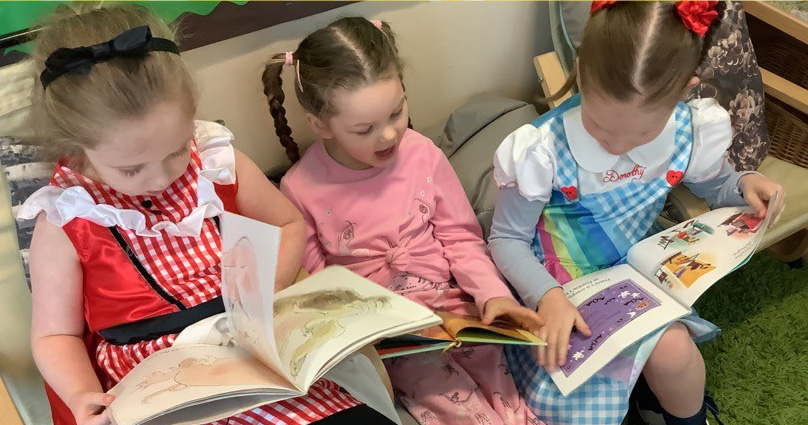
Parental Support
Although pupils are taught to read at school, some parents have asked how they can support their child’s reading journey at home. We promote the following four areas:
Encourage your child to read as often as possible.
We would like children to read for around 15 minutes at least 4 times a week.
Try to build reading time into your daily routine – as soon as they get in from school, before tea or before bed etc. This will make it much easier to sustain.
Encourage your child to read out loud.
This gives them the chance to practice reading with understanding and expression as they can hear their mistakes and learn to correct them independently.
Read to and with your child.
Your child gains so much from hearing an adult read to them, no matter how old they are. Listening to stories provides children with an understanding of how stories are structured, it develops their vocabulary, and it helps provide a context for meaning. In turn, these skills have a positive impact on a child’s writing ability, too. A good strategy is to share a story and take turns reading a page or a chapter each.
Ask questions.
Once children are fluent readers, the focus shifts much more towards understanding. For children in Y1 and above, therefore, the discussion around what they are reading becomes even more important.
The Parent Reading Guide in your child’s reading record provides example questions to support you with this. Please use your own judgement when choosing questions, considering the age/ reading ability of your child, as well as remembering we want to keep home reading sessions light and enjoyable!
Home Reading Rewards
Following feedback from the school council, children have expressed the wish to earn Dojo points when they read at home. Dojo points can now be exchanged for a range of different rewards such as pencils, rubbers etc. or for special treats such as time on an iPad, a day using the teacher’s chair or even lunch with the teacher! This will align reading rewards with others across the school. Children will earn Dojo points following the Bronze, Silver and Gold table below.
| Each time a child reads in a week. (Up to 3 occasions)… | 4 times a week… | 5 or more times in a week… |
| 2 Dojo Points (6 Dojo Points) | 10 Dojo Points | 15 Dojo Points |
Children will also receive a termly certificate, an extra 100 Dojo points and a special treat if they consistently meet the 4 times or more a week reading target.
Reading Events
We instil enthusiasm for reading through our reading curriculum provision and complement this with special events. Some of the ways we do this are:
- Virtual/in-person author, poet and illustrator visits
- World Book Day celebrations
- Book swap events
- Book fairs
- Parent events
- And much more!
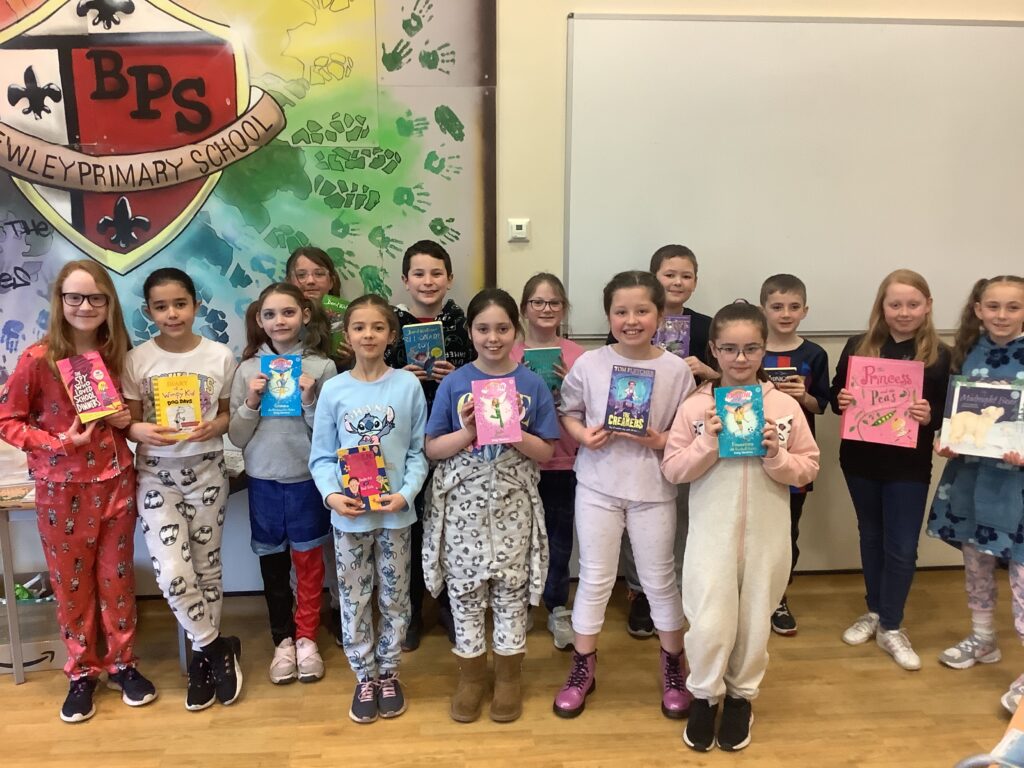
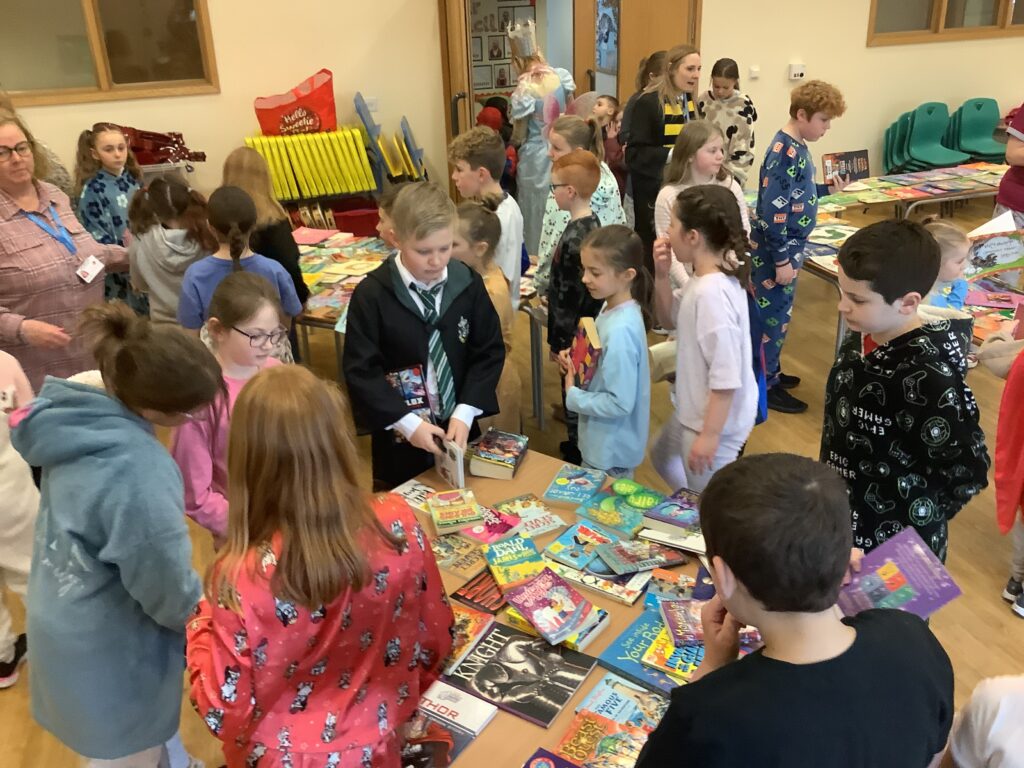
Impact
Over their time in school, our children develop into enthusiastic readers who enjoy showcasing their literacy knowledge and skills. They grow in confidence to challenge themselves in their reading, and love to discuss and share their ideas. Our attainment trend at the end of EYFS, KS1 and KS2 sees us meeting or exceeding the local and national averages at each assessment point.
The impact of our curriculum is visible in:
- Standards in attainment in reading at the end of and between Key Stage 1 and Key Stage 2.
- Strong outcomes in phonics.
- Access to high quality texts both in the classroom and for use at home, which has fostered a love of reading.
- Children’s knowledge and understanding of the reading VIPERS that has supported and improved their comprehension skills.
- A curriculum that is accessible and engaging for pupils of all abilities.
- Stimulating classrooms and outdoor environments that inspire staff and pupils to explore the key skills in English.
- The cross-curricular opportunities that are made to support and extend children’s knowledge and understanding of the world.
Exciting and enjoyable experiences both in and out of school or virtually, which are memorable and inspire children in their work and wider lives.
